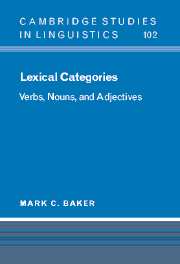Book contents
- Frontmatter
- Contents
- Acknowledgements
- List of abbreviations
- 1 The problem of the lexical categories
- 2 Verbs as licensers of subjects
- 3 Nouns as bearers of a referential index
- 4 Adjectives as neither nouns nor verbs
- 5 Lexical categories and the nature of the grammar
- Appendix Adpositions as functional categories
- References
- Index
Appendix - Adpositions as functional categories
Published online by Cambridge University Press: 06 January 2010
- Frontmatter
- Contents
- Acknowledgements
- List of abbreviations
- 1 The problem of the lexical categories
- 2 Verbs as licensers of subjects
- 3 Nouns as bearers of a referential index
- 4 Adjectives as neither nouns nor verbs
- 5 Lexical categories and the nature of the grammar
- Appendix Adpositions as functional categories
- References
- Index
Summary
Throughout this book, I have assumed that adpositions (prepositions and postpositions) are not lexical categories, but rather functional categories. As such, they have more in common with determiners, pronouns, Pred, and complementizers than they do with nouns, verbs, and adjectives. It is therefore a good thing that my theory of lexical categories has no natural place for them. While this view of adpositions is far from unprecedented, it runs contrary to the more standard generative treatment, championed by Jackendoff (1977: 31–33), in which adpositions constitute a fourth lexical category, filling out the logical space of possibilities defined by the two binary-valued features +/−N and +/−V. In this appendix, I briefly outline some arguments in favor of classifying adpositions with the functional categories, focusing on evidence from incorporation patterns. I also claim that adpositions create a projection that has neither a referential index nor a theta-role. As a result, PPs do not make good arguments or good predicates, but make excellent modifiers. P can thus be thought of as an adjective-like functional category, much as determiner/pronoun is a noun-like functional category and Pred is a verb-like functional category. The properties I have discussed throughout this book as defining the lexical categories can thus be seen also to provide a partial typology of the functional categories.
Evidence that adpositions are functional
There has always been some uneasiness about including adpositions as a lexical category. The popularity of treating them as such has perhaps been caused more by the theoretical attraction of having all combinations of the features +/−N and +/−V be attested than by compelling empirical considerations.
Information
- Type
- Chapter
- Information
- Lexical CategoriesVerbs, Nouns and Adjectives, pp. 303 - 325Publisher: Cambridge University PressPrint publication year: 2003
